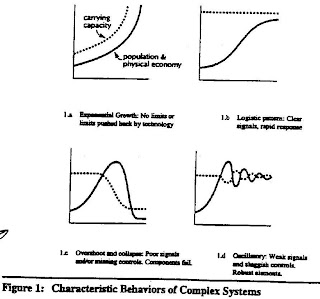So from here on out is my post...

I want to focus on the two components of the article that really impacted me. The first was the 4 graphs he used to illustrate fundamental behaviors of complex systems. I thought this was absolutely fascinating. I respond well to formulas and graphs, because they methodically illustrate a point that can otherwise be difficult to explain. Ehrenfeld uses those 4 graphs to explain how fundamental characteristics of a system can drive the exact same starting conditions into 4 wildly different results. And when you use those graphs to model our macroeconomic system, it becomes clear how critical it is that our economy be properly constrained to avoid a catastrophic crash (akin to his point on extinction).
He talked about how the system has to have signals that can be recognized quickly enough by a control system that can react quickly enough. If the signals are too slow or are unclear, or the control system is too slow to react, then the system will crash out. And this is exactly what we at Presidio fear is happening. We can see that signals aren't clear enough to drive unanimous action by society. And even if they were, our control systems (governments, corporate boards, NGOs) are too slow, too divided, or too powerless to react quickly. And on top of that, there are enough people who believe our macroeconomic model fundamentally looks more like any of the other 3. So most of us here at Presidio might look at all of this and think, oh great, we're screwed. And screwed we may be, but hey, at least we've got a great way to represent it all graphically.
The other neat part of the article was Ehrenfeld's discussion of what he saw as a radical paradigm shift, which he eventually suggests is embodied by industrial ecology. It's not the idea itself that industrial ecology is the new paradigm that I found intriguing. No, instead I was drawn in by this discussion of the very definition of sustainability. He makes it clear that sustainability isn't a technological or economic state of being, but actually a moral choice made by the agglomeration of moral actors in society (e.g. all of us). Some people may react with a "well, duh." But I'm not latching onto the superficial definition of morality here. He's talking about something far deeper than making a moral choice to not drive a car, or to eat vegan, or to never brush your teeth again so as to avoid wasting plastics and toothpaste.
No, he's stating that we are making a moral choice about the kind of world we want to persist indefinitely. Ultimately, as the only self-aware beings on the planet with the ability to effect massive global change, we can choose the state in which we want the world to exist, and then we can freeze it there indefinitely. When we talk about sustainability today, we talk about preserving the world as it stands, with its polar bears and spotted owls and temperate Europe and unflooded coastal zones. But that's a moral choice. We've already vastly impacted this planet; why would we choose to freeze it as it is now? Why not try to rewind to a pre-industrial America and freeze that? Or fast-forward to a Europe covered in glaciers and freeze that? Or ride it out for 500 more years and then freeze whatever post-apocalyptic wasteland exists at that point?
The point is that we're making a moral choice to freeze things where they are today. Is it the right choice? To us it seems like it is. But Native Americans, buffalo, and North American elms and chestnuts might disagree. They'd likely all prefer a world frozen at year 1400 development. And people who own property at 50 ft above sea level might really prefer we wait until the ice caps melt before we freeze things. And on top of all that, there are people who won't want to freeze at all, because it's too hard, or because they just don't care if the world as it exists persists indefinitely, because they place no moral value on future generations, or assume that those future people will adapt and live just fine with whatever they've got (just as we have!!).
So all of us trying to push for a freeze should be aware of exactly what it is we're doing: we're making a very selfish moral choice. Our decision to sustain our current world is not an absolute in the realm of morality. It is highly relative. It's relative to our personal preferences, our personal histories, our personal biases. We don't want to roll back North America to the year 1400 because we live here and don't want to leave. But we do want to freeze the world as it is now because we like Florida and our coastal cities, and we like polar bears and spotted owls and forests and a de-iced Europe. But the cold hard truth is that there's nothing inherently more valuable about any of the things we like than there is about the unspoiled Great Plains or the un-touched Great Northeastern Forest.
So think about that. Get comfortable with your selfishness. And then go out and save the world that you know and love, and say goodbye and that you're terribly sorry to all of the infinite other possible worlds whose existence you're denying. For all you know, they're better than the one you're choosing. ;)
